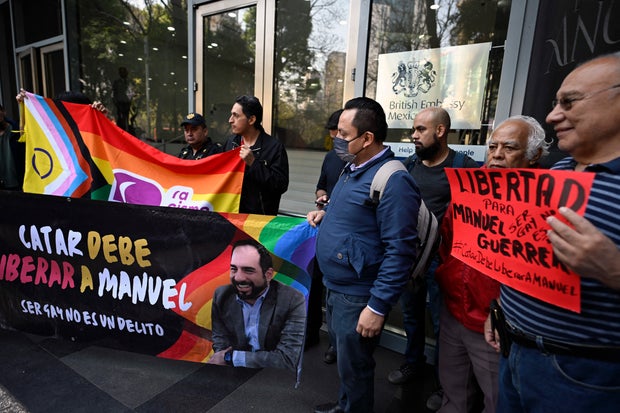A British-Mexican man who says he was targeted for homosexuality and arrested on false drug charges in Qatar has been given a six-month suspended prison sentence, a fine of around $2,700 and an order for deportation by a court in the Arab country. , who is a vital US ally in the Middle East, according to his family and Mexican officials.
In a statement shared with the media by his family, British-Mexican citizen Manuel Guerrero Aviña said he was “deeply disappointed by yesterday’s unfair verdict, delivered despite violations of due process during my detention and trial, which included torture and mistreatment”. to pressure me into revealing the names of other gay partners and force me to use my fingerprint to sign several documents in Arabic without a translator.”
“The Qatari authorities condemned me because I am gay, and this is a violation of my human rights,” said Guerrero Aviña, adding that he was happy to be able to leave Qatar, but condemned what he called an “unfair trial to which I was subjected ”. and the torture and ill-treatment I suffered during my preliminary detention.”
Homosexuality is illegal in Qatar, but Guerrero Aviña, who worked in the airline industry, had a home there and lived a “normal life” without facing any problems with authorities until his arrest, his family said.
ALFREDO ESTRELLA/AFP/Getty
Aviña’s brother Enrique told partner network CBS News BBC News Previously, Manuel had exchanged numbers with someone called “Gio” on the LGBTQ+ app Grindr and arranged to meet at Guerrero Aviña’s house in Doha. When Guerrero Aviña went downstairs to let the man in, his brother said that Qatari police were in the lobby and arrested him. Guerrero Aviña’s brother said that Manuel then had a small amount of amphetamine planted in him and that he had not consumed any drugs.
Qatari authorities said in a statement released to the BBC and other news agencies that Guerrero Aviña was arrested “for possession of illegal substances on his person and in his apartment” and that “no other factors were taken into consideration.”
They said Guerrero Aviña acknowledged possessing drugs and that a drug test for amphetamines and methamphetamines performed by authorities came back positive.
According to Mexico’s Ministry of Foreign Affairs, Guerrero Aviña would be allowed to leave Qatar after paying a fine of 10,000 riyals, equivalent to around US$2,750.
Guerrero Aviña told his family that he witnessed other prisoners being whipped and was threatened with the same treatment if he did not sign legal documents written in Arabic, which he cannot read. His brother said that when authorities learned that Guerrero Aviña was HIV-positive, they took him to solitary confinement and sometimes withheld his medication to try to pressure him into sharing information about other gay men, which he said his brother refused to do. to provide.
Middle East researcher Dana Ahmed told BBC News that Guerrero Aviña’s treatment in detention, and later in the first trial sessions, “raises serious fears that Manuel is being targeted for his sexual orientation and is being coerced into providing authorities information they could use to further the repression of LGBTI individuals in Qatar.”
On a Saturday post on social mediaBritish MP Kate Osborne shared a photo of a letter sent to her and other members of the UK legislature by the country’s top diplomat, Foreign Secretary David Cameron, addressing Guerrero Aviña’s case, in which he said he was ” closely following” the proceedings, but that the UK government was “incapable of interfering in the judicial affairs of other countries”.
bol co
jogo de terror online
novela sbt ao vivo
wishlist
musica terra seca
taça png






















